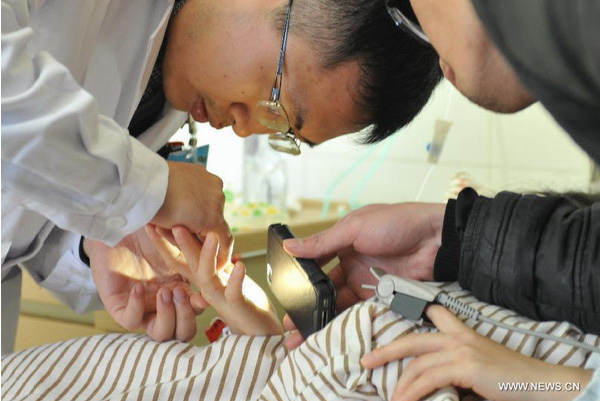 |
|
A doctor removes glass from a victim's hand who is injured of a bus fire at the No.1 Hospital in Xiamen, East China's Fujian province, Jan 15, 2015.[Xinhua] |
China launched a pilot medical reform on public hospitals in 17 cities in 2010, and the guideline stipulates the reform should cover all of the country's 6,800 public hospitals by 2017.
The reform is aimed to change public hospitals' reliance on medicine sales to supplement their income. Public hospitals should establish a reasonable drug pricing system and retune recruitment and salary policies, said the guideline.
Health insurance should cover most of the medical expenditure, while out-of-pocket money, the private bills paid by each patient should be lower than 30 percent by 2017.
The wider plan is to establish a modern hospital management system, eliminating drug price-added profits and standardizing referral procedures.
Public hospitals should be operated for the public good, instead of seeking lucrative gains, and the service should be accessible, equal and efficient for the people, the guideline said.
It also said social medical care should be encouraged through improved policies and strengthened supervision.
The guideline urged reform at the grassroots-level and nurturing more capable doctors.
Authorities will ensure the optimal distribution of medical resources, establish a scientific subsidy mechanism, and regulate the price of drugs and medical services, according to the guidelines.
Full scale reform of the health care system began in 2009. Pilot projects for public hospital reform were a priority, along with a basic medical security system, improvement at grass roots level and equal access to basic public health services.
In the circular, the State Council looked back on the medical services improvement the reform achieved in 2014, and laid out specific tasks and plans for 2015 to address prominent challenges the reform is facing.
The first task is to continue to reform publicly-funded hospitals. In 2015, more publicly-funded hospitals will join the reform.
The reform of the publicly-funded hospitals aims to make their medical services more affordable and their staff more competitive. Also, the reform seeks to control the size of public hospitals so that they don't expand in an irrational manner.
As one important task, publicly-funded hospitals that join the reform are required to sell medicines at the price they bought them, so they won't be able to overcharge patients and doctors will be much less likely to prescribe excessive medicines. On the other hand, the publicly-funded hospitals are allowed to readjust the price charged on their medical services, such as doctor consultation, so that the hospitals and their medical staff will be decently paid for their work instead of relying on selling medicines.
Also, public hospitals should adopt a reasonable performance assessment system for their staff, so that medical workers who work more or do a better job will be better paid. When it comes to determining a doctor's payment, the hospitals must not take into account how many medicines, medical products or medical examinations he or she has prescribed.
Another task is to improve the universal health insurance program. The State Council set a goal that in 2015, more than 95 percent of the country's population will enjoy public health insurance. Authorities should increase the insurance's premium for urban children and the unemployed, as well as rural residents. They should develop and introduce commercial health insurance programs so that medical services, especially the treatment of chronic and serious illness, will be more affordable.
In the circular, the State Council also asked authorities to spend more effort on helping the private sector. In 2015, 20 percent of ward beds and medical services in the country should come from privately-funded hospitals, the State Council said. Authorities should come up with more favorable policies as well as conduct better supervision on privately-funded hospitals.
The authorities should allow the market to determine the price of most medicines, and should turn to negotiations to bring down the price of certain medicines, such as proprietary medicines, the State Council said in the circular.
It reiterated the need to improve the service's quality and the competence of grassroots healthcare institutions, so that more patients can turn to these institutions for small and common illnesses, and be transferred to large hospitals in time if their conditions worsen. This way, a clearly layered and efficient medical service system will be set up, and the pressure on large hospitals will be relieved.
